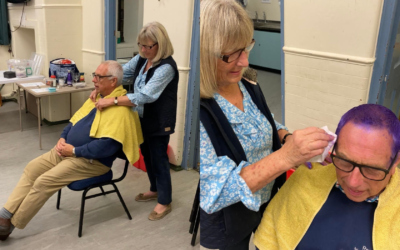The life of an engineer, who was instrumental in developing the iron lung machines which became symbolic in the early treatment of polio, will be commemorated with a sponsored walk next year.
Captain George Thomas Smith-Clarke was an engineer from the Midlands, who was educated at Bewdley Secondary School, Worcestershire, and well known for his work in the automobile and aircraft industries in Coventry.
He also put his engineering skills to use to satisfy his passion for astronomy by building an observatory, housing an eight-inch refracting telescope at Coventry Technical College.
Captain Smith-Clarke, who was commissioned in the Royal Flying Corps during the First World War, was also responsible for building observatories at Herstmonceux in East Sussex and at Jodrell Bank in Cheshire.
But he gained acclaim, and the prestigious James Clayton Prize, for his iron lung invention in 1953, which was made by Cape Engineering Company based in Warwick.
To mark this event, Gary Dancer, Past District Governor for the Heart of England is planning a 1,240 Challenge – a sponsored walk across the area next year.”
The very first respirator was invented in 1927 by Harvard medical researchers, Philip Drinker and Louis Agassiz Shaw.
First developed to treat gas inhalation victims, iron lungs were subsequently used to treat polio patients whose chest muscles were paralysed.
Encased in the cabinet, patients had air pumped into the chamber at alternating pressures, causing the lungs to inflate and deflate so the person could breathe.
Three years later, in 1956, Captain Smith-Clarke designed a baby respirator based on the iron lung design.
To mark this event, Gary Dancer, Past District Governor for the Heart of England is planning a 1,240 Challenge – a sponsored walk across the area next year.
The walk will begin in Bewdley and will finish at the NEC in Birmingham on May 1st, 2020, to coincide with the Volunteer Expo which is being organised by Rotary in Great Britain & Ireland.
“The walk will be based on the life of G T Smith-Clarke, an engineer who did much to develop the iron lung machines which were so symbolic of polio,” explained Gary.
“The Get Moving to End Polio campaign is asking for fundraising projects based on the land border between Pakistan and Afghanistan, a distance of more than 1,240 miles.
“I have proposed that we ask each of our 62 clubs in District 1060 for a minimum donation of £20 which will be £1,240. We will, of course, ask for additional donations from members and the general public as well.
“The walk will be designed to encourage participation by as many clubs and members as possible, by actively joining a section of the walk or by organising an event along the route.
“It is hoped that the combination of the polio story and the considerable local interest story will generate enthusiastic media coverage.”
The walk will cover a total distance of approximately 65 miles over one week.
The proposed itinerary is:
Day 1: Bewdley to Bromsgrove
Day 2: Bromsgrove to Redditch
Day 3: Redditch to Alcester
Day 4: Alcester to Warwick
Day 5: Warwick to Coventry
Day 6: Coventry to NEC
Find out more
The 1,240 Challenge is a new Purple4Polio fundraising activity.
Click here to access a bundle of resources and guidance to setting up your own event.










